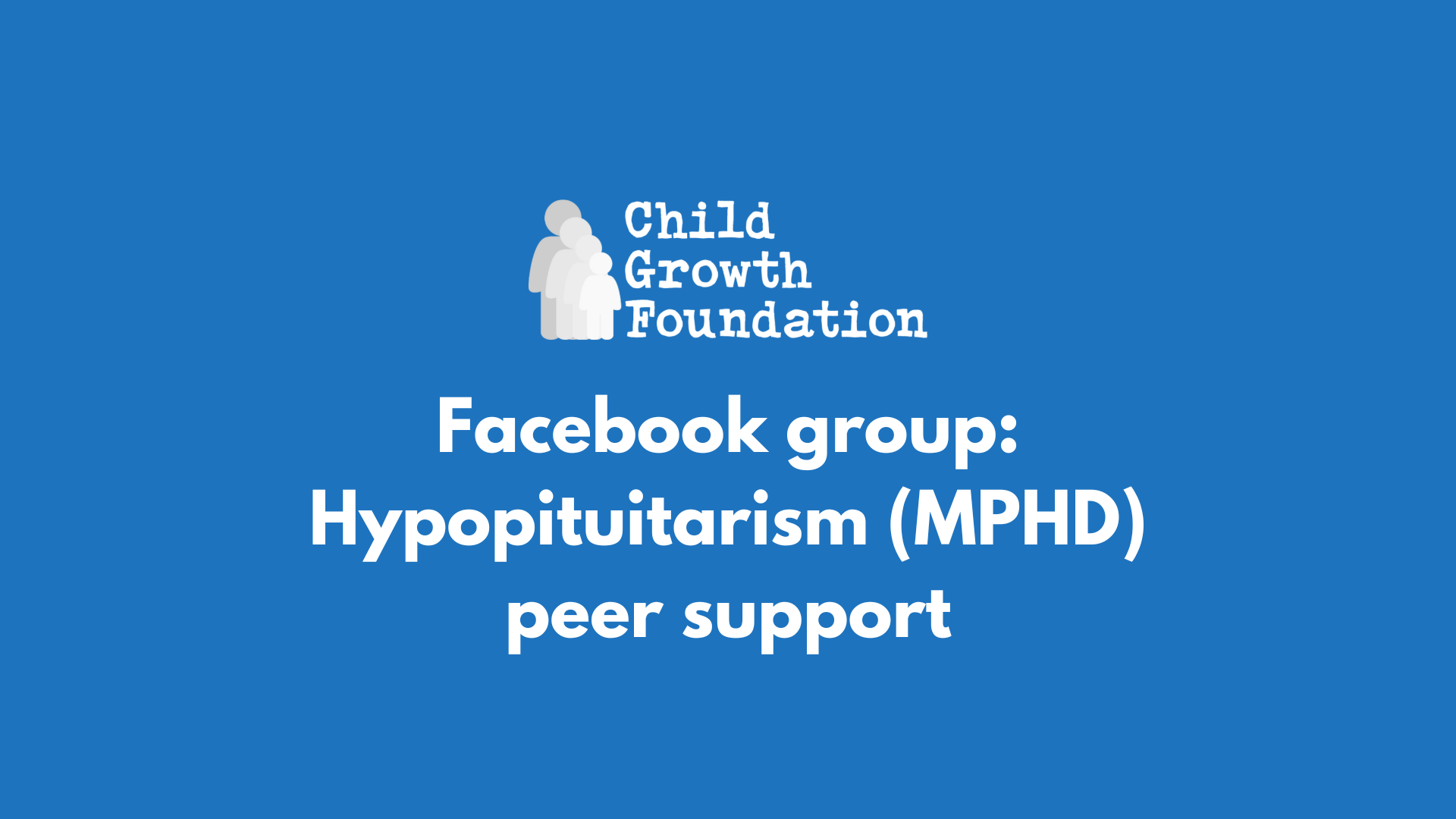Hypopituitarism (MPHD)
Hypopituitarism is a term used to describe a condition when the pituitary gland is not producing enough of one or more of the hormones it secretes.
If two or more of the hormones are not being produced in sufficient quantities, the condition is also known as Multiple Pituitary Hormone Deficiency (MPHD).
The pituitary gland is a small gland located in the base of the brain behind the bridge of the nose, it produces eight hormones which are released into the bloodstream to control other glands. These hormones include:
- Thyroid stimulating hormone which tells the thyroid gland in the neck to release thyroid hormones (T4 and T3)
- Growth hormone which is needed for normal growth and development in childhood
- Adrenocorticotropic hormone (ACTH) which tells the adrenal glands on the kidneys to release cortisol, an important stress hormone
- Gonadotrophins – follicle stimulating hormone (FSH) and luteinising hormone (LH) which are needed to start and progress through puberty
- Anti-diuretic hormone (vasopressin) which helps the body to control water balance and blood pressure
If the pituitary gland is failing to release sufficient quantities of all the hormones it should produce, the condition is known as Panhypopituitarism. Left untreated some of these deficiencies can be life threatening.
Why does it occur?
The exact reason for most occurrences of Hypopituitarism (or MPHD) is not known, therefore they are known as an idiopathic conditions. It is not inherited and can either be present at birth due to the baby’s pituitary gland not developing properly during pregnancy or develop later in childhood due to head injury, tumours or other conditions such as radiotherapy and surgery.
Signs and symptoms
There are many potential signs and symptoms of hypopituitarism depending on which hormones are affected. These may include short stature, poor feeding, lethargy, low blood glucose levels, weight loss/weight gain or delayed puberty amongst others.
How is Hypopituitarism (MPHD) diagnosed?
Hypopituitarism (MPHD) can be diagnosed through blood tests to check various hormone levels and it can be identified from MRI scan to check any damage to, or changes to the structure of, the pituitary gland.
Provocation (stimulation) tests may be required to confirm which hormones need replacing.
Treatment and support
Hypopituitarism (MPHD) is treated through replacing the hormones the body is failing to produce. This can mean a combination of treatment is needed. For example, regular injections of growth hormone, Levothyroxine (to replace the absent thyroid hormones) and hydrocortisone (to replace the absence of cortisol). If gonadotrophin deficiency becomes apparent at the time of puberty (which can be late in growth hormone deficient children), then sex hormones have to be given to initiate sexual maturation and aid bone strength.
Please consider contacting our nurse led Support Line for support and advice.
Facebook Support Group
The CGF run a number of closed Facebook groups, providing peer support for people directly affected by growth conditions, their parents, family and friends.
These groups are a fantastic support tool.
Click the image to find the Hypopituitarism (MPHD) Facebook group.
Spotlight on: Hypopituitarism (MPHD)
A spotlight on Hypopituitarism (MPHD) was shared on our social media channels, and is available to read here on our website too.
Personal stories
Read some personal experiences and stories from people affected by MPHD.
Further reading and downloads
The British Thyroid Foundation
British Society for Paediatric Endocrinology and Diabetes (BSPED)’s Hypopituitarism: Information for patients, parents and carers
My Cortisol app
The My Cortisol app has been created for Great Ormond Street Hospital for Children NHS Foundation Trust. It aims to help parents and guardians with the administration of hydrocortisone sodium phosphate and hydrocortisone sodium phosphate, which is a prescribed medication for those at risk of adrenal crisis. The app includes a helpful video and a pictorial guide.
Adrenal Insufficiency Support Pack
Our Adrenal Insufficiency Support Pack includes a booklet, stickers, keyring and folder. To order your copy please contact [email protected] including a note of your full name and address for us to send your pack to. Click the image of the pack to view the PDF version of the booklet.















